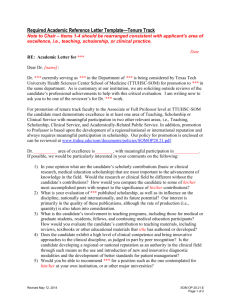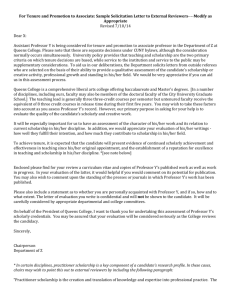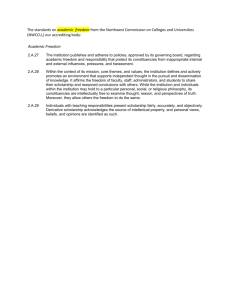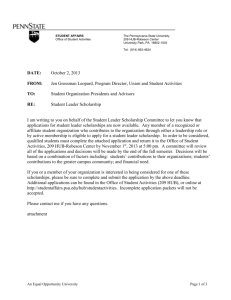TFPP a Review of Teaching Faculty Survey Results
advertisement
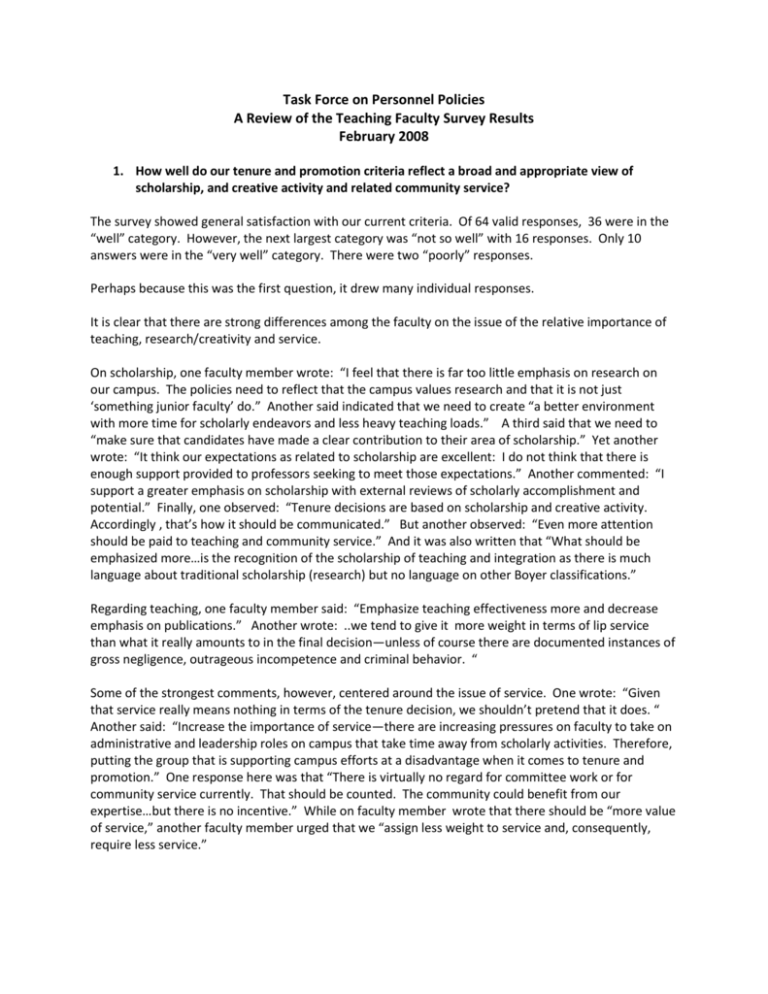
Task Force on Personnel Policies A Review of the Teaching Faculty Survey Results February 2008 1. How well do our tenure and promotion criteria reflect a broad and appropriate view of scholarship, and creative activity and related community service? The survey showed general satisfaction with our current criteria. Of 64 valid responses, 36 were in the “well” category. However, the next largest category was “not so well” with 16 responses. Only 10 answers were in the “very well” category. There were two “poorly” responses. Perhaps because this was the first question, it drew many individual responses. It is clear that there are strong differences among the faculty on the issue of the relative importance of teaching, research/creativity and service. On scholarship, one faculty member wrote: “I feel that there is far too little emphasis on research on our campus. The policies need to reflect that the campus values research and that it is not just ‘something junior faculty’ do.” Another said indicated that we need to create “a better environment with more time for scholarly endeavors and less heavy teaching loads.” A third said that we need to “make sure that candidates have made a clear contribution to their area of scholarship.” Yet another wrote: “It think our expectations as related to scholarship are excellent: I do not think that there is enough support provided to professors seeking to meet those expectations.” Another commented: “I support a greater emphasis on scholarship with external reviews of scholarly accomplishment and potential.” Finally, one observed: “Tenure decisions are based on scholarship and creative activity. Accordingly , that’s how it should be communicated.” But another observed: “Even more attention should be paid to teaching and community service.” And it was also written that “What should be emphasized more…is the recognition of the scholarship of teaching and integration as there is much language about traditional scholarship (research) but no language on other Boyer classifications.” Regarding teaching, one faculty member said: “Emphasize teaching effectiveness more and decrease emphasis on publications.” Another wrote: ..we tend to give it more weight in terms of lip service than what it really amounts to in the final decision—unless of course there are documented instances of gross negligence, outrageous incompetence and criminal behavior. “ Some of the strongest comments, however, centered around the issue of service. One wrote: “Given that service really means nothing in terms of the tenure decision, we shouldn’t pretend that it does. “ Another said: “Increase the importance of service—there are increasing pressures on faculty to take on administrative and leadership roles on campus that take time away from scholarly activities. Therefore, putting the group that is supporting campus efforts at a disadvantage when it comes to tenure and promotion.” One response here was that “There is virtually no regard for committee work or for community service currently. That should be counted. The community could benefit from our expertise…but there is no incentive.” While on faculty member wrote that there should be “more value of service,” another faculty member urged that we “assign less weight to service and, consequently, require less service.” -2There is also some dispute about whether policies ought to be more standardized and consistent or whether they should be flexible. There were a number of calls for greater specificity, concreteness and clarity in expectations. Among the suggestions offered were that we might have a checklist that “indicates progress or status report in all areas at each reappointment….” Another was a call for having “a discussion with the faculty member and not only a paper trail.” Finally, one faculty member mentioned that an “updated faculty handbook would be a great place to start.” 2. How do you think teaching effectiveness, scholarship/creative activity, and service ought to be weighted in the tenure and promotion process? A glitch in the survey made it impossible to determine perceptions of how the three criteria (teaching effectiveness, scholarship/creative activity, and service) are currently weighted in the tenure and promotion process, but in response to the question of how they ought to be weighed, it was very clear that teaching effectiveness should come first (45 of 64 valid responses). There were 15 responses which indicated that scholarship/creative activity should come first and 4 that said service ought to come first. The pattern for what should come second was nearly as definitive. Scholarship/creative activity had 37 responses, teaching effectiveness 17, and service 8. 3. When it comes to the weighting of teaching effectiveness, scholarship and service in the tenure and promotion process, do you think our expectations should be uniform across the entire campus? The dominant response here was “No” with 37 of the 64 valid responses. 24 respondents indicated “Yes.” The individual responses to this question emphasized the value of respecting differences between departments in their emphases. However, a number of responses did stress the importance of teaching. 4. When it comes to the weighting of teaching effectiveness, scholarship and service in the tenure and promotion process, do you think our expectations should be uniform within any department or school? On this question, 43 out of 64 said “Yes.” 17 said “No.” However, among the individual responses were calls for flexibility. One response was that “Different people have different strengths….These difference make for a stronger and more effective whole” and another stated that “I believe departments function best when they have faculty with different strengths. Everyone needs to have a strong area but we need a team with people playing different positions.” -3This question also elicited two responses on teaching and service. One faculty member wrote: “Teaching standards have declined dramatically in the past decade. We have given up on effective teaching and simply allow any teaching.” Another said: “The system should be flexible in two ways— ‘scholarship’ and ‘creativity’ are often narrowly evaluated by number of publications—this needs to be broadened to include scholarship/creative efforts in teaching and community outreach and also grant writing (even if not funded). In addition, the second two criteria—scholarship and service maybe should be considered equal instead of in rank order with scholarship second.” 5. Have you found that your department's guidelines are both adequate and clear in the ways candidates should document effective teaching? 38 out of 64 respondents found their department’s guidelines for documenting effective teaching both adequate and clear. However, nearly one-third (20) did say “No” to this question. This question elicited relatively few comments. Some said that their guidelines weren’t very specific or clear. One faculty member wrote: “The list of documentation required is very stale and shows very traditional and irrelevant way of evaluation. For one thing, our student teaching evaluations are absolutely useless in terms of feedback and commentary that could lead to improvements in our teaching. “ Another criticized department guidelines by noting that “the guidelines give credit for a new course, regardless of how much the students do/do not learn in the course and how effective it is. Once could offer a very poor course and get accolades for presenting a new course.” 6. Although external reviews of candidates are currently optional for those coming up for tenure, should such a review process become required for everyone being considered for continuing appointment? We found a fairly high level of opposition to required external reviews. 43 of 64 responded “No.” Only 15 said “Yes.” While there was one comment in favor (“I think to have outside evaluations is important because it allows peers that might be more knowledgeable and familiar with the candidate’s work to ascertain the significance and impact of that work, as opposed to just our own limited opinion.”) and two neutral responses (“not certain” and “I’m mixed on this; it could beneficial, but probably isn’t needed most of the time.”), the remaining comments were uniformly negative, citing a litany of disadvantages of required external reviews. Among the concerns were the need for a reviewer to have an clear view of the candidate as a whole person and to have a solid picture of the individual’s progress and growth, the need for a reviewer to be familiar with the situation, priorities, requirements and concerns of the campus and of the department, The need for and value of reviewers were also questioned. Departmental colleagues were seen as being perfectly competent to decide on the qualities of the work of candidates. Indeed, “if the people who work most closely with that person can’t figure it out, why would we expect an outsider to do it -4better?” External reviewers are believed to be “quite loathe to write a negative review.” Reviews were seen as amounting to “regulation creep,” as bureaucratic burdens that ultimately fail to provide useful insights, as adding time to and complicating the process, as cumbersome, more work, and not way to guarantee fair and adequate review, and as representing outside interference in campus matters. 7. Should the external review take place at least two years prior to the time of the tenure decision so that there is time to respond to the recommendations/perceptions? The response pattern here was quite mixed. While 28 of 64 said “Yes,” 18 said “No” and there were 12 respondents who gave “other” answers, by far the largest number to do so in this survey. Those who offered responses to this question tended to simply reiterate their opposition to external reviews. However, one faculty member wrote that “…if external review was used, a minimum of two years would be necessary to respond to input. Three years might be better.” Another observed: “many faculty, especially if they have joined Fredonia right out of graduate school, are just gaining momentum in the fifth year, but really make strides prior to tenure (got that book deal, was published in multiple journals, had a solo show/performance). It takes time to build a reputation, is five years enough? And why respond to something in the past (a review from two years ago), instead of promoting what is happening now.” Finally, one respondent wondered: “…who is going to evaluate whether the candidate did follow those recommendations??? What if the candidate did not follow the recommendations because one, s/he did not want to pursue that venue, or two: actually decided to change projects, focus. It does happen in our research and work.” 8. Should that external review be fundamentally formative, offering suggestions for possible positive directions? Formative reviews were fairly strongly favored (34). 19 respondents, however, did say “No.” Once more the written comments emphasized opposition to external reviews. However, one respondent wrote: “I can see both, be descriptive in terms of significance and impact, and formative with some suggestions for future development.” Another stated: “This is offensive to me. If a person is a professional, knows what they are doing and what their own strengths are then why should an outsider be setting the course for that person’s focus? Makes no sense and has the potential to cause confusion and divisiveness.” 9. Should there be multiple reviewers rather than only one? Multiple reviewers (34) were favored over a single reviewer (19). In the comments, once again opposition to external reviews per se was stated. -5However, several comments did add new dimensions to the discussion. One faculty member wrote: “If external reviews are considered, then the current annual appointment reviews should be lessened and restructured. They ask a great deal of faculty, but at least the faculty are being reviewed by their current peers, who probably have a better idea of their teaching effectiveness than an outsider. If this is a research institution, external reviews would make more sense because more emphasis is placed on research than teaching.” Another offered: “It depends on how much emphasis we are going to give to scholarship. I think one would be sufficient since we are an undergraduate institution and we might have small departments where the specialization of a faculty might not be repeated and we might need the outside expert.” 10. Should the candidate be able to choose at least one of the reviewers (if there is more than one)? There was very high levels of support for the candidate being able to choose at least one of the reviewers (49). Only 5 respondents said “No” on this question. Once again, a number of the comments opposed external reviews. One respondent wrote: “I have been an external reviewer more than once, and it is a very big job. I think our faculty would have problems finding multiple useful reviewers.” 11. Should the department or school be able to choose at least one of the reviewers (if there is more than one)? Here, too, there was strong support for the department or school being able to choose at least one of the reviewers (43). Only 9 responded “No.” This question drew relatively few responses. Two of them suggested that the list be drawn up by the candidate. On the other hand, one person noted that “Surely the candidate is going to choose someone who support him/her…” One respondent suggested : “Maybe the department and the candidate should get together and agree on the reviewers—if possible.” 12. Should tenure and promotion procedures be consistent across all departments/schools on campus or is it better if they vary from department to department or school to school? Strong support was voiced for permitting variation from department to department or school to school (44 to 20). There were no comments for this question. -613. Should all committee structures for tenure and promotion be consistent across all departments/schools on campus? There was a virtual tie in responses to this question. 33 indicated “No,” but 29 said “Yes.” There were no comments for this question. 14. Currently some departments/schools have relatively small personnel committees; others operate as a committee of the whole. Which approach do you prefer? Once more there was no consensus in the answers to this question. 34 respondents favored committees of the whole, while 28 favored small personnel committees. There were no comments for this question. 15. Some departments/schools permit only those above the rank being sought to participate in the development of recommendations for reappointment, continuing appointment and promotion while, others allow all tenure-track and tenured faculty to participate. Which approach do you prefer? Here, too, we had a virtual tie. 33 favored participation by everyone at a higher rank, but 30 preferred participation by all tenure-track and tenured faculty. There were no comments for this question. 16. Some department/schools have a hybrid approach which permits all tenure-track or tenured faculty to be involved in a meeting with a candidate and in the discussion of the merits of the candidacy. But then only the faculty above the rank of the candidate actually votes on the personnel action. Do you favor that approach or not? By a better than two to one margin (43 to 19), the respondents indicated that they did not favor the hybrid approach described. There were no comments for this question. 17. Is the current schedule for personnel actions a good one (e.g., should we be reviewing new faculty after a few months on campus)? Although 3 respondents gave “Other” as their answer, for those voting either “Yes” or “No” by a two to one margin (41 to 20) respondents did not believe that our current schedule for personnel actions was a good one. -7While one respondent did write that “I think that it is good to provide formative feedback early on” and two called for reviews in January, the remainder of the comments on what we currently do were quite negative. It was variously characterized as of questionable usefulness, creating unnecessary work for the department, creating undue stress for the candidate, repetitive, inefficient, ridiculous, and NUTS!!!!!.” 18. Would you favor (or oppose) offering possible new tenure-track faculty an initial contract of two years rather than the current one year? There was very strong support for initial two year contracts (49 favored, only 14 were opposed). There were no comments for this question. 19. If a new tenure-track faculty member had an initial two-year appointment, would you favor (or oppose) having the first formal review being for yet another two year period of time, e.g., a formal review at the start of the second year for an additional two year appointment? Respondents were split on this issue. 33 favored another two year contract, but 29 were opposed. There were no comments for this question.


